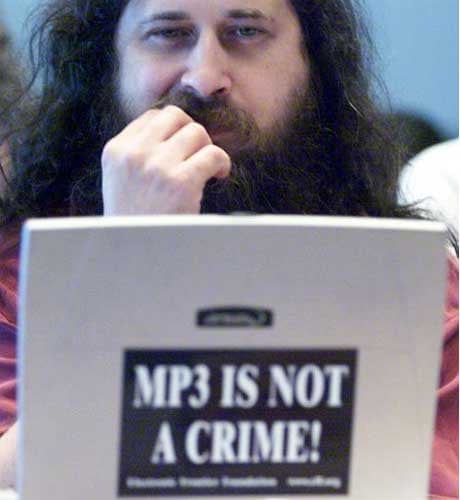Richard Stallman is about as hi-tech as they come. For decades he has been one of the world's most famous computer programmers and holds a position as a research affiliate at the renowned Massachusetts Institute of Technology.
As founder of the free software movement in the 1980s, Stallman has been the inspiration for computer hackers around the world, and these days the 55-year-old spends his time travelling the globe and speaking about his work.
But despite this hi-tech pedigree, he is one of a number of people who chooses to restrict his use of popular technologies in a way that may seem contrary.
As a privacy campaigner, for example, he refuses to carry a mobile phone. And even though most of his work takes place on a computer, Stallman only sporadically connects to the internet and purposely avoids surfing the web.
"Very often I'm on planes or buses, or in a place where there's no internet, so I couldn't possibly do my work if I couldn't do it offline," he told the Guardian from his office in Boston. "Fortunately I have a powerful computer, and it's capable of doing an awful lot without a web connection – something which many users don't seem to know about any more."
'I don't do e-commerce'
Stallman said that he might surf the web "if I'm visiting somebody's house", but says he refuses to indulge himself too much. "I don't identify myself, and I don't do e-commerce," he added.
Stallman's approach is partly philosophical and partly about keeping on top of things. He only checks his email after answering the existing messages, for example. In this he is not alone. Most of us know the feeling of dread when our computer pings and announces the arrival of yet another email, and research from the University of Glasgow has shown that 34% of us feel overwhelmed by the number of messages they receive.
People working in the computer industry are often among those most affected by the weight of modern communications, since they frequently adopt the newest systems to help them stay always-on and constantly connected.
However, despite the lure of email, blogs and the internet, some of the most accomplished technologists react by choosing to severely limit their interaction with the hi-tech world.
Clifford Stoll, an astronomer who helped catch Soviet computer hackers in the 1980s, was an early internet sceptic and now campaigns against the introduction of computers in schools. Stoll rarely uses the net, although he retains a website where he sells homemade glass bottles.
In the most extreme cases, technologists can become so disenchanted with the touted benefits of new systems that they end up disconnecting almost entirely.
Life without email
Retired professor Donald Knuth, like many 70-year-olds, doesn't use email, but his lack of involvement was the result of a conscious decision made nearly 20 years ago. The computer scientist, who lives in a house on the campus of California's Stanford University – the institution that has spawned giant technology corporations including Google, Hewlett Packard and Yahoo – says he simply doesn't want to waste his time.
The hours he saves from not indulging in constant communication allow him to carry on work on his most famous book, The Art of Computer Programming – which has so far taken nearly 40 years to write, and he's only reached volume four of seven.
"Email is a wonderful thing for those people whose role in life is to be on top of things," Knuth says on the university's website. "But not for me: my role is to be on the bottom of things."
The handful of high-technologists who have retreated from digital life are part of what Kevin Kelly, a founding editor of Wired magazine, has labelled the "Neo-Amish". Rather than succumb to hi-tech temptations, these highly competent engineers and programmers are choosing to drop out of the always-connected culture in favour of a better quality of life.
"Lots of people complain about being overloaded with email, blogs, Twitter, and so on," he wrote on his website earlier this year. "But very few who complain reach the ultimate logical solution: turn it all off."
Such solutions may appear drastic, but the problem of information overload is remarkably common, according to Mark Hurst, author of Bit Literacy, a guide to keeping your digital life under control. He believes that many people are crushed by the amount of communication they receive, even if they won't admit it.
"People are carrying enormous amounts of stress and anxiety over this, and most people don't even understand how much it affects them," he said. "Untamed, this problem achieves gigantic proportions in their lives."
Technology worship
Stallman believes the problem is that too many are in thrall to the promises made by new developments. "It's almost as if they worship technology and they don't care about the social consequences of using it," he said.
However, Hurst says that unlike Knuth, who has an assistant who brings him a new batch of messages every three months, or Stallman, who has the luxury of running his own organisation, not everybody is in a sufficiently privileged position to give up entirely.
"There are people on the extremes who can afford to do that. If you're extremely rich you can have an assistant, or if you live off the grid somewhere you might have little need for these technologies," he said. "But the vast majority of people have responsibilities that require them to be connected."
